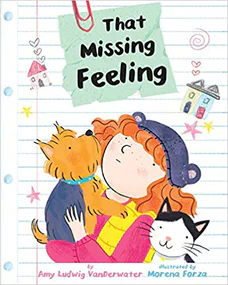That Missing Feeling
Written by Amy Ludwig VanDerwater
Illustrated by Morena Forza
40 pages
•
Published 2021 (Magination Press)

Recommended Age Range: Kindergarten through 3rd grade.
Publisher's Summary:
Mia’s life feels split in two after her parents get divorced – even her cat and dog now live in two separate places. When she’s at her dad’s house, Mia misses her mom’s jokes and singing. And when she’s at her mom’s house, she misses her dad’s laugh and cooking. Mia just can’t quite shake that missing feeling. Sometimes that missing feeling makes her angry. And sometimes it makes her sad. One day when Mia visits her Grandpa, he gives her a little blue notebook saying, “When I write about Grandma, I am sad but I am happy too.”… Mia keeps her notebook wherever she goes, writing about happy and sad memories. And soon her notebook becomes a way to balance that missing feeling.

Dr. Annie's Takeaways
Recommended for: This book helps children to name the feeling of “missing,” which many children frequently feel following parents’ separation or divorce. It suggests journaling (drawing and/or writing) as a strategy to cope with this feeling. It’s best read after parents’ separation has already occurred and a child has a working understanding of separation/divorce. This book features a grandfather confidante and would be great if read with an extended family member or therapist, particularly if paired with a gift of a small journal or notebook.
Tone: Warm, emotionally evocative, hopeful
Story Quality: This is a heartfelt story that articulates a feeling particular to divorce–the “missing feeling” that many children very frequently feel after parents separate. The story nicely validates a child’s painful feelings while providing a strategy for feeling better that does not over-promise or depend on a divorce going smoothly or happily.
Illustrations: Cute brightly-colored, cheerful illustrations.
Representation: Mia is a White girl with orange-colored hair. She has a White mom and a White dad who separate at the beginning of the story (it is not explicitly stated that they got divorced). Mia has a cat who lives with her mom and a dog who lives with her dad. Mia’s parents have shared custody, and Mia spends time at both of her parents’ homes, but the story doesn’t specify how much time she spends at each. Mia has a grandfather who is White and whose wife died before Mia was born. Mia and her grandfather are close.
Psychological Practices: This story helps children to put a name to a feeling that they might be struggling to articulate–the missing feeling. Mia misses her mom and her cat when she is at her dad’s, and she misses her dad and her dog when she is at her mom’s. She misses spending time with both her parents, and she misses giggling. The book suggests an intervention that can be very helpful for children who are grieving and adjusting to a big change–journaling. Mia’s grandfather gives Mia a journal and tells her that journaling helped him after Mia’s grandmother died. Mia starts drawing and writing about what she is missing, and it helps her to cope with the missing feeling. This book could be really helpful for a therapist or counselor to read with a child to help them to process their feelings about their parents’ divorce and to introduce the idea of journaling or drawing as a coping strategy. Grandparents or extended relatives helping a child to cope with a divorce might also find this book helpful, particularly if they have a little notebook or some paper to share with a child.
Concerns: Mia states that she doesn’t want to talk with her parents about her feelings because she is afraid that it might make them sad. Instead she talks with her grandfather about her feelings and journals about them. This is realistic, in that many children intuitively pick up on their parents’ distress during a divorce and try to protect their parents from their own feelings. It is also sad, and I kind of wish that the book had ended with Mia sharing some pages of her journal with her parents. That said, not every parent is capable of receiving a child’s painful feelings about a divorce, especially if they are having their own mental health crisis, and this book doesn’t promise that they will be. It promises that a child can find someone to share their feelings with and that it will help. If appropriate, I would remind a child that it is not their job to protect their parents’ feelings and that their parents want to know how they are feeling, even if it is painful.
